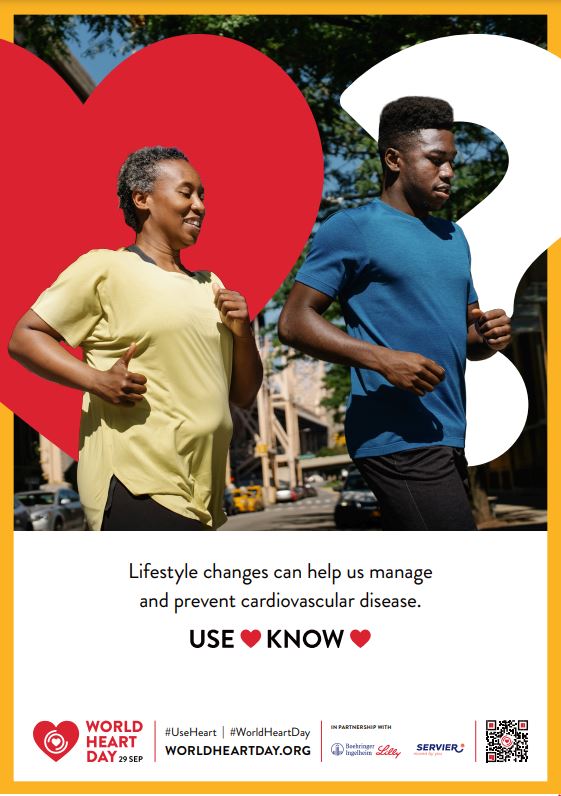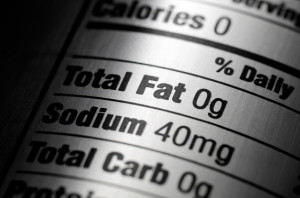
September 29 is World Heart Day, but – in my humble opinion – shouldn’t EVERY day be “Heart Day”? After all, we need our hearts healthy and optimal 24/7, and we need to think about heart health more than once annually.
The heart is a muscle, but unlike biceps or triceps muscles, keeping the heart strong doesn’t mean growing its size. We strengthen our hearts by being physically active, eating a healthy diet, and keeping our blood pressure in check.
Nearly 75 million people in the U.S. have high blood pressure, known as hypertension. Worse is that for half of those people, it’s not “in check”. In fact, nearly 1 in 7 people with hypertension don’t even know it. Blood pressure is almost impossible to determine without testing, but being overweight, inactive, and eating too much salt (sodium) can raise your risk. Blood pressure can be high though, even if your weight is normal.
Salty Truths
 Salt adds no calories to our food, no matter how much we add, and we add a lot of salt to foods! When I watch TV chefs, I’m amazed at how freely they throw salt into dishes. The average sodium intake in the U.S. is 3,400 mg/day. That’s 50% higher than the recommendation of 2,300 mg/day! I speak here about regular, or “table” salt – sodium chloride. This includes sea salt, Kosher salt, and even “flavored” salt, like onion or garlic salt.
Salt adds no calories to our food, no matter how much we add, and we add a lot of salt to foods! When I watch TV chefs, I’m amazed at how freely they throw salt into dishes. The average sodium intake in the U.S. is 3,400 mg/day. That’s 50% higher than the recommendation of 2,300 mg/day! I speak here about regular, or “table” salt – sodium chloride. This includes sea salt, Kosher salt, and even “flavored” salt, like onion or garlic salt.
Eat out a lot? You can get 3,600 mg of sodium in a single meal! Restaurants are notorious for adding lots of salt to food. Why? It’s an easy way to amplify flavor. You may have even seen flakes of “finishing” salt topping anything from stews to sweets. Indeed, the whole sweet-savory trend has been popular for years now. Salted caramel brownie, anyone?
Low-Down on Sodium
Salt may increase flavor, but it can also increase blood pressure, and that does no one’s heart any good. While some people are not “salt-sensitive,” if you have high blood pressure, you may be advised to reduce your sodium intake. Many people associate “low sodium” with low taste (bland taste) and sure, if you take out the salt – and don’t replace it with anything – flavor will be less intense.
Wouldn’t it be nice to lower your sodium intake AND amp up the flavor of food? Science can put someone on the moon, shouldn’t science be able to come up with a better way to flavor food than with a salt shaker?
Science didn’t come up with it…Mother Nature did.
Umami: Nature’s “Secret “Sauce” Flavor Tool
 Think of these naturally low-sodium but delicious foods: tomatoes, mushrooms, beef, yogurt. What do they have in common? Umami. It’s the “fifth taste”, after sweet, salty, sour, and bitter. I think of umami as “flavor intensity” because that’s what it brings to any food that has it.
Think of these naturally low-sodium but delicious foods: tomatoes, mushrooms, beef, yogurt. What do they have in common? Umami. It’s the “fifth taste”, after sweet, salty, sour, and bitter. I think of umami as “flavor intensity” because that’s what it brings to any food that has it.
Umami is the taste generated by the amino acid glutamate. Yes, the same glutamate in MSG, or monosodium glutamate. Glutamate has always been in these foods, and many others. Indeed, aged cheeses like parmesan, are absolute umami bombs. Yes, they also have sodium, but you need very little parmesan to really spike the flavor of a dish. (Pro tip: my go-to: sprinkle a teaspoon of grated parmesan on salad. It’ll get you wanting a lot more veggies!)
Scared of MSG?
Forget that. You’ve been eating high-umami/glutamate foods for years without even knowing it. Where would Italian and Mediterranean food be without tomatoes, mushrooms, eggplant, Greek yogurt and cheese?
Then there’s this umami factoid: our bodies make glutamate! Glutamate is a “non-essential” amino acid because we can make ourselves. “Essential” amino acids we need from food.
Using MSG in cooking can even help cut your sodium. How? Gram for gram, MSG has 62% LESS sodium than regular salt.
Tips to cut sodium and BOOST flavor
- Mix salt and MSG 1:1 and keep it in the salt shaker for whenever you do use salt. Add sparingly – with MSG, you only need a little to get a lot more flavor!
- Use more high-umami foods every day. More tomatoes, grilled veggies like eggplant, zucchini, and asparagus.
- Season veggies with a hint of grated parmesan.
- Get the herbs and spices out of the cabinet and onto the table! Having jars of onion powder, oregano, red pepper flakes and cinnamon at arm’s reach encourages each family member to customize their meal – and they’re sodium-free! (Personal favorite: sprinkle cinnamon on vanilla Greek yogurt!)
- Tomato paste! I think of it as an umami concentrate – and low in sodium. Use it to thicken stews and sauces, mix with a little sour cream or Greek yogurt to top baked potatoes, and I use it on sandwiches instead of mayo! (Bonus: Count 2 tablespoons of tomato paste as a serving of veggies – and plenty of umami!)
- Lean beef – it’s loaded with glutamate. Most fish have glutamate too, and both are heart-smart.
More good news: Using the above tips, you’ll dial down your sodium intake, probably eat more veggies and fruits, and get more potassium, a mineral that also helps lower blood pressure.
Happy Heart Day… and year!
More about World Heart Day
World Heart Day (September 29) is sponsored by the World Heart Federation, as “a reminder to everyone around the world to take care of their hearts. This year’s campaign focuses on the essential step of knowing our hearts first.” World Heart Day is an annual observance and celebration held on September 29 that is intended to increase public awareness of cardiovascular diseases, including their prevention and their global impact.
More about Umami (and MSG) as Part of a Heart-Healthy Diet

